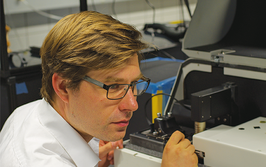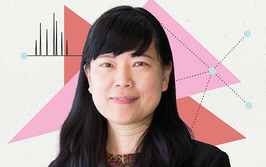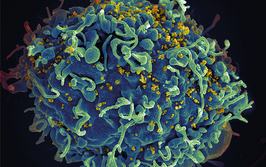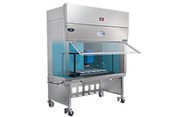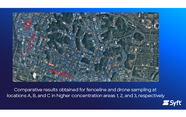Ruedi Aebersold
The Power List 2013

Ruedi Aebersold
Professor, Institute of Molecular Systems Biology, Swiss Federal Institute of Technology (ETH), Zurich, Switzerland
What do you consider to be your biggest impacts on the field?
“The development of techniques to analyze the complexities of the proteome. ICAT (Isotope-Coded Affinity Tag) labeling is one of them. We then developed a whole range of computational tools to analyze MS data culminating in the open-source Trans-Proteomic Pipeline (TPP). More recently, we have contributed new analytical workflows for targeted proteomics to more precisely observe the quantitative behavior of sets of proteins across many samples.”
The Power List’s top two spots go to proteomics pioneers...
“I think it’s clear to everyone that the genome is only part of the picture in terms of how biological systems function. It’s also clear that most of the cell’s executive molecules are proteins. That’s why there is enormous interest in being able to comprehensively and quantitatively analyze the proteome.”
What keeps you excited about your work and at the leading edge?
“What’s most exciting is that through technology development we generate the ability to see a completely new and different picture of what’s going on in biological systems. There are very few research fields – or jobs – that enable you to see something for the very first time. We are in a privileged position.”
Future aspirations?
“I want to continue to make headway in understanding how the proteome relates to function. We are only at the beginning of this journey. We need to understand how multiple proteins cooperate and organize themselves in living cells – and how changes in this organization affects cell health.”
Where do you see the field of proteomics in ten year’s time?
“The goal will be to understand the dynamics of the proteome in time and space – an enormous task. I think MS will continue to play a substantial role, but single cell and imaging approaches will also be essential. We need to know how healthy and diseased cells differ mechanistically and how we can pharmacologically reset those cells in a diseased state. That will be the future of proteomics.”
Further comments?
“We have been very fortunate to lead research programmes with long-term perspectives and relatively good funding, which is essential for the development of breakthrough techniques. In the current climate, investment is in jeopardy because funders are pushing for immediate translation of results into the health sector, which is great... if you have something to translate. My hope is that some funding agencies will continue to support basic technology development, because, if successful, it can have an enormous impact by opening new avenues for scientific research.”
www.imsb.ethz.ch/researchgroup/rudolfa

